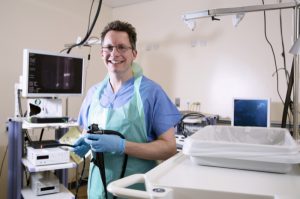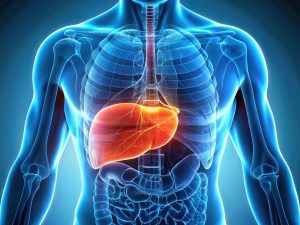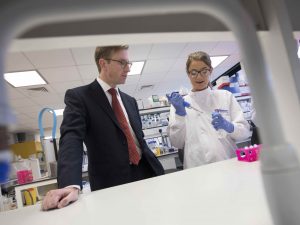
University of Edinburgh researchers are spearheading efforts to combat Non-Alcoholic Fatty Liver Disease (NAFLD)
Professor Jonathan Fallowfield, Personal Chair of Translational Liver Research & Honorary Consultant Hepatologist, describes his work.
Many of us working in the sphere of NAFLD recognise the large steps forward we have taken in recent years. However, despite all this progress, we are still facing numerous barriers to significant improvement of patient care and outcomes.
Firstly, NAFLD has a highly variable and unpredictable rate of progression, with a lack of validated prognostic biomarkers to predict longer-term clinical outcomes.
Another challenge is that although weight loss of over 10% is an effective treatment, this is hard to achieve and even harder to maintain and, currently, there are no approved medicines for the treatment of non-alcoholic steatohepatitis (NASH – the most aggressive form of NAFLD) or liver fibrosis.
Lastly, public awareness of the disease remains low and is a barrier to preventative health strategies and to enrolment in clinical trials. For example, even among patients most at-risk for NASH (i.e., those with type-2 diabetes, obesity and hypertension), only 6% had ever heard of NASH (Continuum Clinical, 2019).
This is particularly worrying given that NAFLD is now the most common cause of chronic liver disease in Western countries, with a global prevalence of 25% and rising.
Approximately 5% of UK adults are estimated to have NASH, which is associated with the risk of progression to fibrosis/cirrhosis, liver cancer and death. Indeed, people with NASH have an overall mortality rate of 7.9% within 7 years of diagnosis – almost twice that of the general population.
A pan-Scotland effort
These are just some of the galvanising reasons that led me to be the clinical lead on SteatoSITE: an integrated gene-to-patient data commons for NAFLD research – an ambitious £1.7 million initiative funded by Innovate UK. SteatoSITE is a pan-Scotland effort, managed by Precision Medicine Scotland, that will incorporate digital pathology and quantification, hepatic RNA-sequencing and electronic health record data (comorbidities, prescribing, laboratory tests, clinical outcomes) from around 1,000 (retrospective) cases across the NAFLD disease spectrum. SteatoSITE is expected to foster multiple new collaborations with academic and industry partners.
In addition, exciting ‘spin-off’ projects to SteatoSITE are already underway, including a $1 million international collaboration co-led by myself and Dr Tim Kendall and funded by Innovate UK (‘Development of an INTEgrated PREcision AI Tool for the stratification of Non-Alcoholic Fatty Liver Disease (INTErPRET-NAFLD)’) – a partnership between experts in digital pathology, data processing and AI.
Working with an expert team
We are making incredible progress on multiple fronts only because of the exceptional range of individuals I am lucky enough to be working with.
For example, by using the University of Edinburgh’s cutting-edge imaging capabilities, Professor Scott Semple and I are right at the forefront of MRI-based biomarker development for NAFLD and other liver disease indications (including two recent Innovate UK-funded projects totalling more than £2.3 million in collaboration with Perspectum Diagnostics).
This also applies to ‘Breathomics’ where Professor John Plevris, Professor Peter Hayes and I have also recently developed methods and explored the utility of measuring volatile organic compounds in exhaled breath as diagnostic (‘stratification’) biomarkers in NAFLD.
Furthermore, the University of Edinburgh specialises in interdisciplinary molecule-to-man approaches to drug development for NAFLD which include expertise in cell differentiation and tissue engineering (Professor David Hay), control engineering/microfluidics (Dr Filippo Menolascina), single-cell RNA-sequencing (Dr Prakash Ramachandran and Professor Neil Henderson), bioinformatics (Dr Frances Turner, Dr Donald Dunbar), histopathology (Dr Kendall), in vivo NAFLD models (Professor Nik Morton, myself), drug discovery methods (Professor Scott Webster), mass spectrometry imaging (Professor Ruth Andrew), preclinical (Dr Maurits Jansen) and clinical (Professor Semple) imaging … among a wide-ranging cast of outstanding researchers.
Our Team Science approach is exemplified by ongoing studies using computational/bioinformatic analysis of RNA-sequencing datasets to inform the development of a multiplex tissue staining assay for NAFLD and testing of novel drug combinations in a microfluidic in vitro NAFLD model. Moreover, engagement with pharmaceutical companies to evaluate proprietary therapeutic candidates in preclinical models or in clinical trials is also a key facet of our research portfolio at the Edinburgh Clinical Research Facility.
A public health crisis
As I mentioned earlier, NAFLD represents a public health crisis and has massive and disproportionate healthcare and societal impacts. This means we are also actively engaging with the public, with patient representative groups and the British Liver Trust to increase awareness by disseminating our research to the widest possible audience.
Unchecked, the trajectory of NAFLD is worrying and could cause a significant and unnecessary healthcare burden. With our ongoing research, I am confident that we will unlock the secrets of NAFLD and begin to grasp this unfolding public health crisis. At the University of Edinburgh, we are using our expertise, facilities and capability to support that research journey from bench to bedside; to significantly improve outcomes for those suffering from NAFLD now and in the future.
EI services for University of Edinburgh staff.
Edinburgh Clinical Research Facility provides state-of-the-art facilities to support multidisciplinary clinical research locally, nationally and internationally.




Business Development Manager
Roslin and Easter Bush Campus